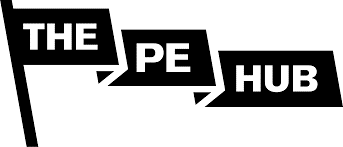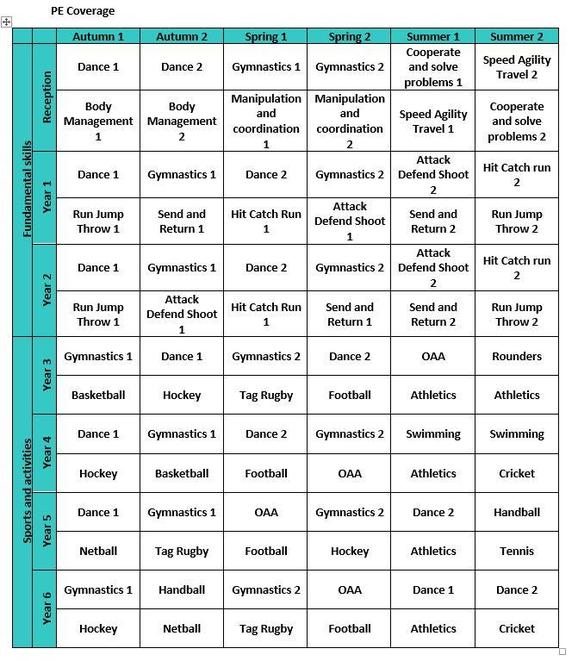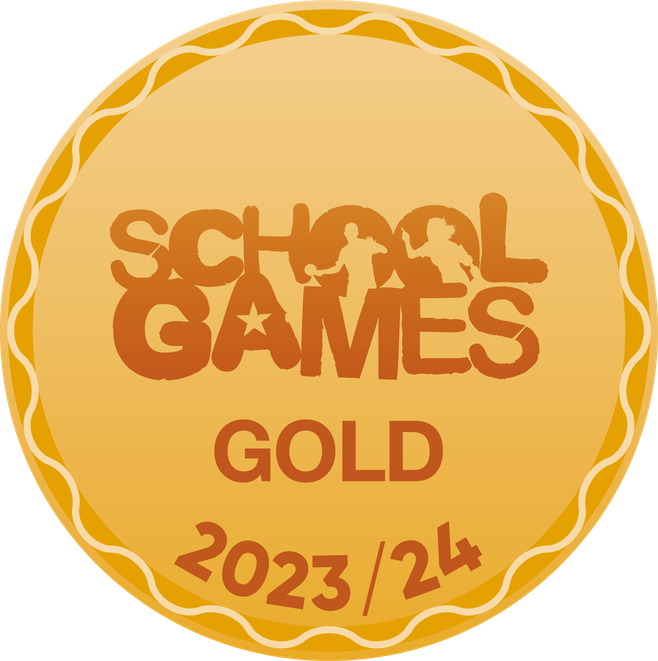Physical Education
Intent
At Ashmead school, we want our active citizens and sports people to become physically confident and competent, in a way that supports their health, fitness and mental well-being. We intend to deliver a wide range of physical activities and sports, as part of a broad and balanced curriculum, ensuring pupils are able to enhance existing skills, learn new skills or be introduced to new sports, clubs, teams and organisations. Alongside our school values, we teach our pupils to understand fair play and equity of play and embed life-long values and the disciplines PE promotes. Opportunities beyond PE lessons such as extra-curricula clubs, festivals, tournaments and competitions promote a further sense of community for our pupils.
Implementation
The PE curriculum is taught through the use of The PE Hub, which directly links to the National Curriculum, and ensures a progressive model for pupil learning. The scheme provides top-quality content, with clear and high expectations, which is adapted to align with the needs of all pupils.

The long-term plan, created through The PE Hub, sets out the PE units which are to be taught throughout the year, and ensures that the requirements of the National Curriculum and EYFS are fully met. It ensures that pupils have time to practice increasingly complex movement patterns through a range of approaches to develop, consolidate and deepen their knowledge, understanding and skills.
‘We have designed The PE Hub to give schools a broad menu of activities to choose from when planning their curriculum. The PE Hub provides coverage of the National Curriculum by dividing it up into three main areas; which we have designated as follows:
1. Physically competent, physically active.
2. Tactics and strategies, decision maker, creative and competitive.
3. I can, I want to, I will.’
The progression document for each activity outlines the key skills and concepts pupils will master over time, including motor competence, rules, strategies, tactics and knowledge of safe and effective participation.
In line with the Early Years framework, pupils’ physical development is one of the prime areas of learning and underpins the development of other skills such as reading, writing and attention. Fundamental movement skills are a clear focus and encouraged using both the indoor and outdoor provision. Specific areas and resources have been developed for pupils to learn and practise specific skills, including balancing, climbing, jumping, throwing and catching, and kicking and moving in a range of ways. Pupils develop skills through adult-led activities and opportunities within continuous provision and play.
In Key Stage One and Key Stage Two each class has access to two hours of high-quality physical activity every week, comprising of a combination of indoor and outdoor sessions. Within each lesson, pupils are given the opportunity to practice skills in a variety of ways, building upon what has been learnt previously, and allowing pupils time to embed them within their long-term memory.
Pupils participate in a range of activities including: Invasion Games, Net and Wall Games, Striking and Fielding, Gymnastics and Dance, Athletics Activities, Outdoor Adventure, Health Related Fitness and Swimming.
Sports and activities are thoughtfully and carefully selected ensuring progression of knowledge and skill as a priority. Our rationale also considers other factors underpinned by the use and impact of the PE and Sport premium with the aim to increase staff confidence, knowledge and skills in teaching PE and sport; increase engagement of all pupils in regular physical activity and sport; raise the profile of PE and sport across the school to support whole school improvement; offer a broader and more equal experience of a range of sports and physical activities to all pupils and increase participation in competitive sport.
We consider pupil voice, including sports or activities the pupils would like to participate in, access, or feel they would like to develop. We select sports and activities pupils may be invited to compete in against other schools so pupils feel confident. We identify activities and sports pupils could freely access for recreational purposes, providing pupils with the knowledge and skills to safely set up games to support playtimes or free time outside of school in a socially respectful manner. We want to provide a passion for health and fitness and identify accessible local clubs linked to the activities and sports selected should pupils wish to pursue an activity or sport further. Sports and activities are repeated annually based on skill progression so pupils are able to draw upon prior learning and develop their knowledge and skills further.
Where units are repeated within a year group, the units provided by The PE Hub ensure progression, e.g. Dance 1 and Dance 2. The activities and sports are distributed to ensure maximum use of facilities and equipment available.
Swimming
The pupils in Year 4 receive weekly swimming lessons, as a 12-week block per class, with the aim of being able to: swim competently, confidently and proficiently over a distance of at least 25 metres, use a range of strokes effectively and perform safe self-rescue in different water-based situations. Everyone Active school’s swimming programme is accredited by Swim England and endorsed by double Olympic Champion Rebecca Adlington. It promises quality teaching that is inclusive to all and tailored to the individual abilities of every pupil.

Knowledge of knowing what (declarative knowledge) and knowing how (procedural knowledge) is best applied through physical demonstration/modelling and physical participation. Through demonstrations, which may include external expertise, teacher demonstration, videos, or in-class experts, all pupils can develop a clear picture of what success looks like and focus towards it. Ultimately, the instruction, practise and feedback that pupils receive within lesson time should enable all pupils to develop their competency, reinforcing the important message that everyone can improve. We also appreciate that PE provides a different environment to the classroom setting and some pupils may require different forms of support to access the curriculum.
Appropriate vocabulary is explicitly considered and taught within the curriculum planning to enable our pupils to communicate with confidence, access learning and participate with assurance. Subject specific vocabulary (Tier 3 vocabulary), e.g. precise names of rules, strategies, tactics, and words which may have several meanings within written text (Tier 2) are identified so pupils can learn the definitions within context. Within lessons, we encourage pupils to evaluate their own work as well as the work of their peers. For this to be successful, and feedback focused on improving the quality of their efforts, pupils are taught how to assess though clear learning objectives, success criteria and understanding of key terminology.
Inter-house competitions & Extra Curricular Activities
Every pupil is assigned to a house: Kestrels, Falcons, Hawks and Eagles and the inter-house competitions allow every pupil the opportunity to play representative sport and work as a team.
We attend inter-school competitions which comprise of friendlies, matches, festivals, tournaments or organised leagues.
Extra Curricular opportunities enable pupils to participate beyond their PE lessons, giving them more time to practise, extend and refine their knowledge. It also celebrates a variety of different activities, some of which might not be included in the school PE curriculum. This also includes the importance of protecting opportunities for physical movement and activity during play-time and lunch time. For a full list of termly clubs, please see the icon on the school website.
We want our pupils to be aspirational and have therefore identified athletes and teams from a wealth of sports covered, including diversity in terms of gender, able bodied or disabled, different cultures, religions, local, national and international, for example, to inspire our pupils. These are introduced at the start of each unit.
Impact
Our active citizens and sports people will be confident and able to talk about what they have learnt in PE, and the wider opportunities given, using subject specific vocabulary. Pupil voice will demonstrate that pupils enjoy PE and are able to recall their learning over time. Pupils work and performance in lessons demonstrates that PE is taught at an age appropriate standard across each year group with opportunities planned in for inclusion of all.
- EYFS statutory framework.pdf
- National Curriculum - Physical Education.pdf
- P.E Policy
- PEHub Progression of skills.pdf
- PEHub Declarative and Procedural Knowledge KS1.pdf
- PEHub Declarative and Procedural Knowledge KS2.pdf
- PEHub Key Vocabulary.pdf
P.E. in the Curriculum
At Ashmead Combined School, we endeavour to provide the children with a diverse and exciting P.E. curriculum.
We use the National Curriculum to plan and differentiate lessons to challenge whilst supporting their learning.
The National Curriculum for KS1 and KS2 can be found here.
Using the PE Hub as our scheme of learning enables teachers to deliver high quality P.E. lessons for both indoor and outdoor PE sessions.
Within lessons, we encourage the children to take a responsible and conscientious attitude to their learning by using self-assessment and peer coaching. We also promote the love of learning through child-led warm ups, demonstrations and mini activities whilst also encourage and instilling leadership qualities by using the School Games Values: Self Belief, Respect, Passion, Honesty, Determination and Teamwork.

Competitions, Matches & Festivals

List of Fixtures, Competitions and Events 24-25
| Yr 5/6 Skipping Rope Festival | The Mandeville School | 10th October |
| Yrs 3-6 Cross Country | Turnfurlong Junior School | 23rd November POSTPONED new date: 8th February |
|
Yr 3/4 Girls Football |
The Mandeville School | 22nd January |
|
Yr 5/6 Netball |
St. Mary's CE School | February |
|
Yr 5/6 Netball |
Oak Green School | February / March |
|
Yr 5/6 Netball |
Edlesborough Primary Academy | Thursday 6th March |
| Yr 5/6 Netball | Waddesdon Village Primary School | February / March |
| Yr 5/6 Netball | Stoke Mandeville Combined School | February / March |
| Year 4 Multi Skills | Aylesbury High School | March |
| Year 2 Multi Skills | Aylesbury High School | June |
Swimming
The children in Year 4 go swimming once a week at Aquavale Swimming Pool, Aylesbury.
As part of our partnership with Aquavale, we now offer provision for those children who are unable to swim 25m independently through Booster sessions. If your child is eligible for this, you will be notified from Miss Venn.
Swimming and water safety
All schools must provide swimming instruction either in key stage 1 or key stage 2.
"In particular, pupils should be taught to: swim competently, confidently and proficiently over a distance of at least 25 metres use a range of strokes effectively [for example, front crawl, backstroke and breaststroke]
perform safe self-rescue in different water-based situations."
What does my child need for Swimming?
Each swimming session costs £2.50 and is paid via Parent Mail. Please email the office for more information on how to pay for swimming. If you would like to contact the school in confidence regarding payment, please contact Mrs Thompson.
Your child will need a Swimming bag including:
- a towel
- a swimming costume / shorts
- a swimming hat
If your child needs to wear goggles for a medical reason, you will need to write a note to your child's class teacher to inform them.
Please note: Children are permitted to wear a pair of leggings and a t-shirt underneath their swimming costumes/shorts if they feel more comfortable doing so.
When is my child going Swimming?
Each class will go swimming on a Friday.
Swimming Data
| By the end of Key Stage 2: 2023-24 cohort | |
| Swim competently, confidently and proficiently over a distance of at least 25 metres | 18% |
| Use a range of strokes effectively [for example: front crawl, backstroke and breaststroke] | 75% |
| Perform safe self-rescue in different water-based situations | 100% |
"Booster sessions" will be available for those children who need them and will be organised by the school (these are normally in half term holidays). You will be contacted personally if your child needs to attend Booster sessions for swimming.
| By the end of Key Stage 2: 2021-22 cohort | |
| Swim competently, confidently and proficiently over a distance of at least 25 metres | 41% |
| Use a range of strokes effectively [for example: front crawl, backstroke and breaststroke] | 83% |
| Perform safe self-rescue in different water-based situations | 61% |
Booster Sessions
February half term 2022: 18, of which 50% reached National Curriculum requirements
May half term 2022: 22, of which 0% reached National Curriculum requirements
| By the end of Key Stage 2: 2020-21 cohort | |
| Swim competently, confidently and proficiently over a distance of at least 25 metres | 19% |
| Use a range of strokes effectively [for example: front crawl, backstroke and breaststroke] | tbc |
| Perform safe self-rescue in different water-based situations | 48% |
Due to COVID-19 lockdowns, we are unable to show any data for 2019-20.
| By the end of Key Stage 2: 2018-19 cohort | |
| Swim competently, confidently and proficiently over a distance of at least 25 metres | 52% |
| Use a range of strokes effectively [for example: front crawl, backstroke and breaststroke] | 34% |
| Perform safe self-rescue in different water-based situations | 73% |
Sports Premium Spending
Please click the link below to view the document which will outline the intent, implementation and impact of the funding:
What is Sport Premium?
All children and young people should live healthy active lives. The UK Chief Medical Officers recommend that all children and young people should take part in moderate to vigorous intensity physical activity for at least 60 minutes every day. Children with special educational needs and disabilities should take part in 20 minutes of daily activity.
The Childhood Obesity Plan says that at least 30 minutes of daily activity should take place in schools.
Schools have a key role to play in achieving this aim. This is particularly true of Ashmead Combined School where the foundations of positive and enjoyable participation in regular physical activity are embedded. All children have equal access to high-quality PE provision and opportunities to experience and participate in a wide range of sports and physical activities. Academic achievement can improve at Ashmead Combined School because of the benefits children can gain.
How is the grant used in schools?
Schools should use the PE and sport premium funding to help achieve these aims. It must not be used for core-type school activities. They should use it to make additional and sustainable improvements to the PE, sport and physical activity they provide, such as:
funding high-quality PE and sport for at least 2 hours a week, complemented by a wide range of extracurricular sport and competitive opportunities
providing or improving equal access to sport for boys and girls
Schools should prioritise PE and sport premium spending to improve in the following 5 key areas:
increasing all staff’s confidence, knowledge and skills in teaching PE and sport
increasing engagement of all pupils in regular physical activity and sport
raising the profile of PE and sport across the school, to support whole school improvement
offer a broader and more equal experience of a range of sports and physical activities to all pupils
increase participation in competitive sport







